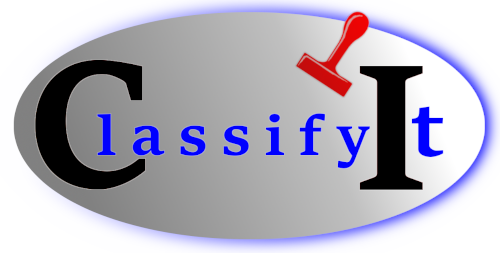ClassifyIt [klasɪfʌɪ ɪt ] - The Classification Tool
ClassifyIt – because if it's important, you classify it.
Understanding the classification of your emails and documents is the first and most crucial step in protecting sensitive and valuable information of your company or organization.
ClassifyIt helps enforce consistent data classification through both clear visual markings and technical metadata – making your information security policies easy to follow and harder to ignore.
Use ClassifyIt to apply and enforce email and document classifications, ensuring that every file and message is handled according to your organization’s standards.
What
A security tool to support and enforce security classification markings on all Microsoft (R) Office (TM) 2010 applications, and higher versions thereof.
A security classification could look like this:

or this:

ClassifyIt supports any layout and wording of your classifications.
What - Example: Information classification according to ISO 27001
ISO 27001 does not prescribe the levels of classification – this is something you should develop on your own, based on what is common in your country or in your industry. The bigger and more complex your organization is, the more levels of confidentiality you will have – for example, for a mid-size organization you may use this kind of information classification levels with three confidential levels and one public level:
- Confidential (top confidentiality level)
- Restricted (medium confidentiality level)
- Internal use (lowest level of confidentiality)
- Public (everyone can see the information
When
Utilize ClassifyIt to designate security classification labels for word documents or emails, enabling the marking of content with either a security classification or a sensitivity label. This feature facilitates the clear indication of the information's sensitivity level within the document or email.
Why
Information classification is a vital part for ISO 27001 certifications. Without classifying your information by enforcing a classification marking to all emails, documents, presentations and sheets, there will be no common handing and protection by those having access.
Documents and emails are the main media to transfer information with others. Start with data leak prevention by using the ClassifyIt tool, providing awareness to your users/personnel with readable, not changable security classification markings. Further technical security measures are also important, but will follow on the basis of your classification markings.
ClassifyIt supports the security classification markings of documents (for example OPEN, RESTRICTED or SECRET) and markings indicating or authorising the releasae of the document (for example PUBLIC, INTERNAL, MANAGEMENT). With such markings all of your users know how to handle the document and on boundaries to external networks your guarding technology (e.g. mailguard) could verify that a recipient is allowed to receive such classified documents.
Encryption
ClassifyIt supports 3 encryption schema - each schema uses AES-256 encryption:
1. Standard Encryption: encrypts with built-in keys and can be decrypted by any user of ClassifyIt
2. Pin Encryption: encrypts with a key which is based on a PIN the user provides. Only recipients who are given the PIN (for example by phone) can decrypt.
3. Public Key Encryption: encrypts by using the public key of the recipient(s). Only recipients who have the corresponding Private key can decrypt.
How
If you have a security marking policy for your company and use ClassifyIt to support and enforce this security marking policy. If you don't have a security marking policy you should create a simple one and then use ClassifyIt to support and enforce it - a great starter is the Traffic Light Protocol which is widely used by governmental organisations (see for instance the following WIKI link: http://en.wikipedia.org/wiki/Traffic_Light_Protocol).
Or contact us for supporting your needs please contact us at:
Help
If you need help, please contact us at:

